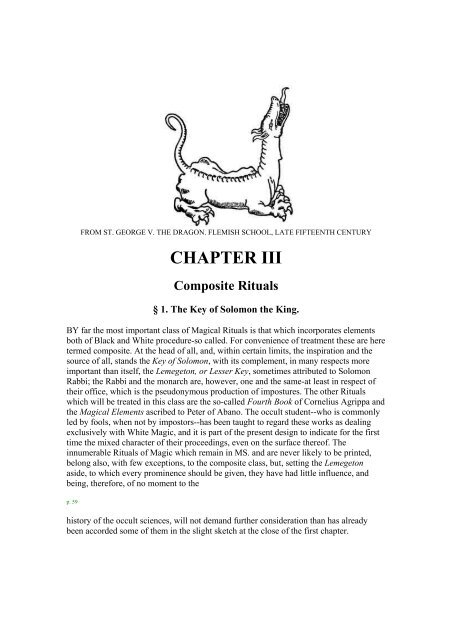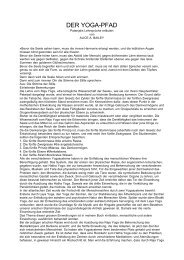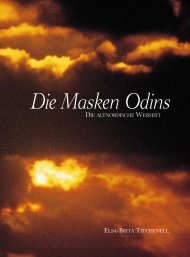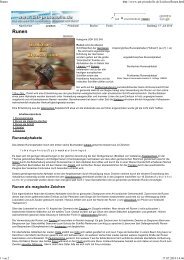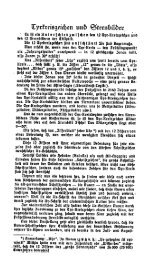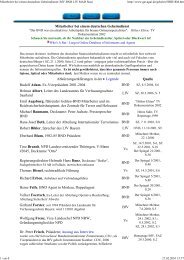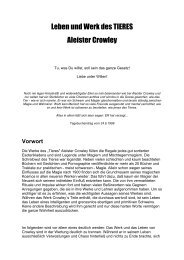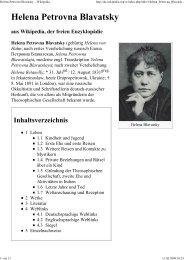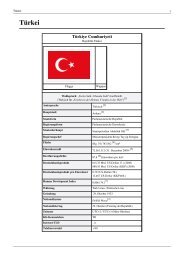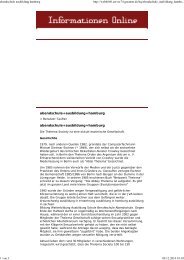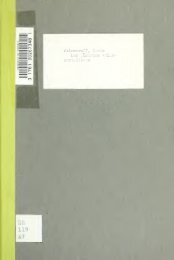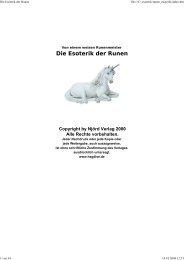- Page 1 and 2:
THE BOOK OF CEREMONIAL MAGIC The Se
- Page 3 and 4:
§ 7. TALISMANS OF THE SAGE OF THE
- Page 5 and 6:
§ 3. CONCERNING THE EXPERIMENT OF
- Page 7 and 8: talisman with the monogram of Micha
- Page 9 and 10: connection with the congeries of ar
- Page 11 and 12: ehind Magic, or that even the occul
- Page 13 and 14: THE TEMPTATION OF EVIL From Cædmon
- Page 15 and 16: qualification of the soul's eternit
- Page 17 and 18: and suffered and died, had risen an
- Page 19 and 20: about the quest and its enthusiasm,
- Page 21 and 22: that anything responds to its metho
- Page 23 and 24: gold earth. There words and wishes
- Page 25 and 26: ecommendation that it was a convent
- Page 27 and 28: ejected, and it follows in this man
- Page 29 and 30: position, but it is regrettable tha
- Page 31 and 32: which usually terms itself Black, b
- Page 33 and 34: convocation of all the "masters of
- Page 35 and 36: the Sworn Book, while that entitled
- Page 37 and 38: properly understood, is, however, a
- Page 39 and 40: It is an open question whether all
- Page 41 and 42: THE CHARACTER OF BETHOR The affairs
- Page 43 and 44: THE CHARACTER OF PHUL Lunary concer
- Page 45 and 46: 30:2 This reference, taken in conne
- Page 47 and 48: Footnotes 35:1 Claviculæ Salomonis
- Page 49 and 50: of his great prosperity is acknowle
- Page 51 and 52: specific difference between the pra
- Page 53 and 54: for ever , Amen. May the blessing o
- Page 55 and 56: worst, are scattered, all infirmiti
- Page 57: p. 55 PLATE IV MYSTIC FIGURES OF TH
- Page 61 and 62: impostures of colportage; but in wh
- Page 63 and 64: p. 65 for seventy-two chief devils
- Page 65 and 66: The Ruler of the Eighth Hour is OSG
- Page 67 and 68: Gabriel; for the Earthy Triplicity,
- Page 69 and 70: with the entire hierarchy must comp
- Page 71 and 72: empowered thee, whereunto I now adj
- Page 73 and 74: Spirit which we intend to call. If
- Page 75 and 76: There can be no doubt that these di
- Page 77 and 78: naked maid; a she-goat; a camel--po
- Page 79 and 80: Paris, but at the instigation of je
- Page 81 and 82: Abramelin the Mage was an instructo
- Page 83 and 84: IV. THE CONSTITUTION OF POPE HONORI
- Page 85 and 86: combinations of characters, whereby
- Page 87 and 88: process for the evocation of evil s
- Page 89 and 90: Principem et ejus Angelos Conjurati
- Page 91 and 92: 104:2 La Clef des Grands Mystères.
- Page 93 and 94: conjurations, all exceedingly brief
- Page 95 and 96: p. 116 apparitions of blazing lamps
- Page 97 and 98: The characters should be graven on
- Page 99 and 100: The characters should be graven on
- Page 101 and 102: TALISMAN VIII. The characters shoul
- Page 103 and 104: The characters should be graven on
- Page 105 and 106: The characters should be graven on
- Page 107 and 108: The characters should be graven on
- Page 109 and 110:
I must pass, however, to the incuba
- Page 111 and 112:
THE APPARITION OF THE GRAND CABALA
- Page 113 and 114:
PLATE VI: THE SABBATIC GOAT DEVIL F
- Page 115 and 116:
p. 141 the book of True Black Magic
- Page 117 and 118:
one, and the other is a distant dan
- Page 119 and 120:
p. 147 strict, the meals being limi
- Page 121 and 122:
147:2 The statement is adapted from
- Page 123 and 124:
Hogos = Venus = ♀ = Friday. Cocao
- Page 125 and 126:
It will be seen from this table tha
- Page 127 and 128:
p. 155 shaping it with a new sword
- Page 129 and 130:
p. 159 poniard or stiletto and the
- Page 131 and 132:
156:3 Of a black cat, says the Clav
- Page 133 and 134:
it to your abode. You must next go
- Page 135 and 136:
The instruction continues---As it i
- Page 137 and 138:
Footnotes 168:1 This process is ada
- Page 139 and 140:
Take your kid; place it on a block
- Page 141 and 142:
When you have skinned it, take salt
- Page 143 and 144:
170:1 The Key of Solomon, Book ii.
- Page 145 and 146:
This Aspergillus may be used on any
- Page 147 and 148:
Footnotes 177:1 The mutilations of
- Page 149 and 150:
SATAN BOUND. ON PRE-NORMAN CROSS SH
- Page 151 and 152:
THE SEAL AND CHARACTERS OF BEELZEBU
- Page 153 and 154:
It will be seen that the principali
- Page 155 and 156:
CHARACTER OF MERSILDE MERSILDE can
- Page 157 and 158:
CHARACTER OF MORAIL MORAIL has the
- Page 159 and 160:
187:2 The second Spirit of the Leme
- Page 161 and 162:
of the hierarch; they must have bee
- Page 163 and 164:
VIII. BARBATOS, a great count and d
- Page 165 and 166:
THE SEAL OF SYTRY THE SEAL OF BELET
- Page 167 and 168:
XX. PURSON, 4 a great king, who app
- Page 169 and 170:
THE SEAL OF BUNE XXVI. BUNE, a stro
- Page 171 and 172:
202:6 Another codex reverses this,
- Page 173 and 174:
THE SEAL OF SOLAS THE SEAL OF PHŒN
- Page 175 and 176:
XLI. FOCALOR, a strong duke, appear
- Page 177 and 178:
command of the operator will make a
- Page 179 and 180:
THE SEAL OF OROBAS THE SEAL OF MURM
- Page 181 and 182:
LX. VAPULA, a strong duke, comes in
- Page 183 and 184:
THE SEAL OF BELIAL causes favours o
- Page 185 and 186:
THE TRIANGLE OF SOLOMON the first s
- Page 187 and 188:
THE PENTAGRAM OF SOLOMON men. The c
- Page 189 and 190:
MAGICAL SWORDS AND WAND obtained pa
- Page 191 and 192:
FIRST CONJURATION I invoke and conj
- Page 193 and 194:
INVOCATION OF THE KING O thou great
- Page 195 and 196:
ind thee to remain affably and visi
- Page 197 and 198:
ASTRACHIOS, ASACH, ASARCA, ABEDUMAB
- Page 199 and 200:
THE IMP STATUE. LINCOLN. Footnotes
- Page 201 and 202:
operator shall rejoice in the honou
- Page 203 and 204:
THE GREAT CIRCLE OF WHITE MAGIC You
- Page 205 and 206:
which you may hear, for at this ext
- Page 207 and 208:
Further, I command thee to surrende
- Page 209 and 210:
to the entrance of the circle. Then
- Page 211 and 212:
yourself with the stone called Emat
- Page 213 and 214:
Reply of the Spirit I cannot grant
- Page 215 and 216:
y Whom thou art overcome; when thy
- Page 217 and 218:
MYSTIC FIGURES FROM THE TITLE-PAGE
- Page 219 and 220:
A later edition substitutes the fol
- Page 221 and 222:
words:--May this which hath been re
- Page 223 and 224:
p. 276 The Beginning of the Holy Go
- Page 225 and 226:
p. 278 A. P. Why tarriest thou, and
- Page 227 and 228:
God invisible, consubstantial, in a
- Page 229 and 230:
A LESSER PENTACLE OF SOLOMON To dis
- Page 231 and 232:
the time of His dolorous passion an
- Page 233 and 234:
on Monday; compose the circle, and
- Page 235 and 236:
Write about the circle as follows:
- Page 237 and 238:
p. 293 Trinity. Come without inflic
- Page 239 and 240:
y the other Sacred Names of the mos
- Page 241 and 242:
of . . . . . . . . . that as the fa
- Page 243 and 244:
When the characters and images have
- Page 245 and 246:
Whether in the increase or wane of
- Page 247 and 248:
p. 208 of a dead man; place one of
- Page 249 and 250:
No person who is familiar with the
- Page 251 and 252:
For the Masters of Black Magic, as
- Page 253 and 254:
upon, &c. [Here name the subject up
- Page 255 and 256:
Lord, Who hast been, Who art, Who s
- Page 257 and 258:
IT is only within recent times that
- Page 259 and 260:
Then gently smiting the carcase nin
- Page 261 and 262:
God , by the most holy wounds of ou
- Page 263 and 264:
The most barbarous and unintelligib
- Page 265 and 266:
sanctuaries to which I alluded far


